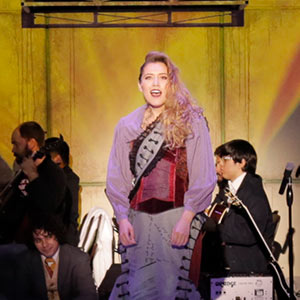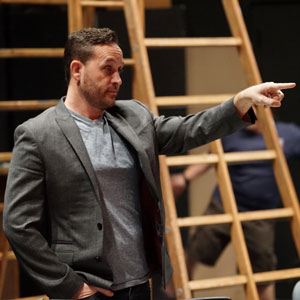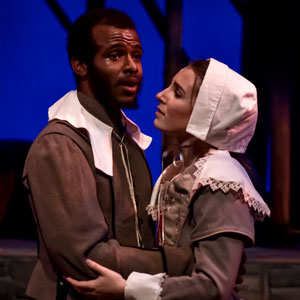'Hype' Comes to FC's Corner
— Fullerton College Hornet - John A. Fulton - Monday, May 12th, 1997. This week the Fullerton College Theatre Department will unleash it's third production of the 1997 Spring Semester line-up; "The Great White Hope." "Hope'' is the loosely based story of real-life 1908 heavyweight champion of the world, Jack Johnson, the first black boxer to win the title. In the play, the character is named Jack Jefferson.- "Hope'~ retells the story of the perils Johnson faced by being the first black heavyweight champion, the angry white conspirators who sought to have him taken down; and the love that intensified the said situation, with a white woman. The story of his triumphs, tragedies and questionable downfall are the forefront of "Hope."
"We have been gently testing our waters. Especially in the last two seasons," director Gary Krinke says. "It really started two years ago, with 'M. Butterfly,'where we had an entire Asian kind of focus. We tried that and it was one of the most successful things we've ever done."
The theme kept going with shows like "Roosters," which closed two weeks ago. The theater department wanted to conquer ethical bounds to further diversify itself and, at the same time, lure in different nationalities to show that theater isn't just for a particular group or race.
"We can never give up on the fact that our geographical location and our student population are changing drastically," Krinke stated." What we have is the desire to say to an entire population, 'Come and celebrate the show.''
"Hope" was chosen because! it dealt with the African-American culture, something FC's Theatre· Department hasn't challenged until now. Krinke says he mainly chose the show because it's a good show. "It's a Pulitzer. Prize winning show. In fact, it won all the major awards when it came out. Arid it still tells a very prevalent story, even though it is set in 1905.
Krinke knew that time didn't diminish the message. the show brings. A phone call from his brother was evidence of that. Krinke explained,. "I have a brother, who lives in Florida, who called me a couple of weeks ago. He simply said, 'Do you know that two miles from where I live, they hanged a black man? And [people are treating it as] no big deal.' So even though it's set in that time period, there are still some things that are very prevalent in the story. I think it's an excellent, excellent story."·
Heading ·up the cast is Anthony Mutune,who plays the persecuted hero, Jack Jefferson. Mutune has his own challenges aside from the Character. Krinke tried to explain the situation as best he knows it, "I think he's from Kenya, which is under British rule.. So in addition to speaking another language, under a British rule, he came here and had to learn English. Then learn it in standard American dialect for a show about a character who lives in Africa.'' With Mutune's language, not having some sounds (like a long "E" sound) that are necessary to deliver the lines, he and Krinke have taken some time to get him in the knack of doing it correctly (the word "peace" was sounding like "piss"). Krinke's been going over it to be sure that the line is delivered accurately because, "when you get excited, I know what [Mutune's] going to want to say."
The "N-word" is used in the show so be orewarned. Krinke wanted to stay true to the script so, little is left out.
"That's what they would've said then. You can't clean it up. We're doing it as though this were period perfect, not something that's been translated to the '90s," explains Krinke.There are also sections that are somewhat violent. "I hope we get the support, audience-wise, to see it and challenge it. And I hope people don't walk away going 'Oh that was 1905 that doesn't happen anymore'" Krinke said.








